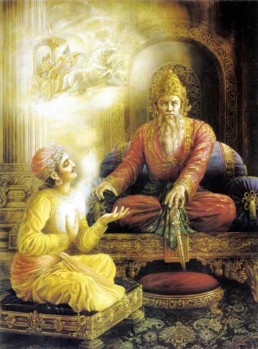Swami Chinmayananda Commentary
No doubt, the Kauravas, grown blind in their greed for power and wealth, cannot see the destruction of the entire social structure by this war. Their ambition has so completely clouded their intelligence and sensibility that they fail to appreciate or understand the cruelty in annihilating their own friends.
But Arjuna seems to retain his reasoning capacity and can clearly foresee the chaos in which society will get buried by fratricidal war. Now his argument amounts to this: if a friend of ours, in his drunkenness, behaves nastily, it would be worse than drunkenness in us, if we were to retaliate; for, we are expected to know that our friend, with his fumed-up intelligence, does not entertain enough discriminative awareness of what he is doing. At such moments, it would be our duty to forgive the mischief and overlook the impudence.
Similarly, here, Arjuna argues: “If Duryodhana and his friends are behaving as blind aggressors, should the Pandavas not retire quietly and suffer the ignominy of a defeat, and consider it their dutiful offering at the altar of peace?” How far this philosophy is dangerous in itself will be seen as we read more and more the passages of the Geeta and come to appreciate the pith of its philosophy which is the very kernel of our Hindu way-of-living.
“Active resistance to evil” is the central idea in the doctrine expounded by Krishna in the Geeta.
Adi Sankara Commentary
Sri Sankaracharya did not comment on this sloka. The commentary starts from 2.10.
The Bhagavad Gita with the commentary of Sri Sankaracharya – Translated by Alladi Mahadeva Sastry
Holy Geeta – Commentary by Swami Chinmayananda
The Bhagavad Gita by Eknath Easwaran – Best selling translation of the Bhagavad Gita
The Bhagavad Gita – Translation and Commentary by Swami Sivananda
Bhagavad Gita – Translation and Commentary by Bhaktivedanta Swami Prabupadha
Srimad Bhagavad Gita Chapter 1 – Verse 39 – 1.39 katham na jneyam – All Bhagavad Gita (Geeta) Verses in Sanskrit, English, Transliteration, Word Meaning, Translation, Audio, Shankara Bhashya, Adi Sankaracharya Commentary and Links to Videos by Swami Chinmayananda and others – 1-39

